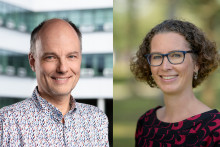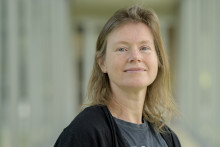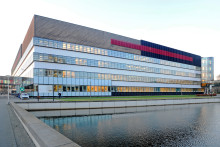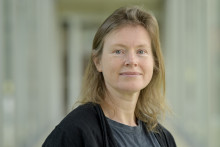S&T situation
How is the Faculty of Science & Technology doing now, barely six months after the reorganisation was implemented? U-Today spoke with the faculty board, an employee threatened with dismissal and with those left behind. This is part 3, about 'those left behind'
Huskens and Lindhoud make no bones about it. Although they did not end up on the list of employees threatened with dismissal, the reorganisation took a heavy toll on them. Their department was hit hard: they have to say goodbye to eleven colleagues and are - still - 'among the misery' every day. 'Because yes, of course that's what it's mainly about,' says Lindhoud. 'Very logical too, but it does something to you as a colleague.'
'It's hard to escape that collective gloom and uncertainty. That also does something to your work' - Saskia Lindhoud
Withdrawing from misery
Recently, they were both at a conference abroad. 'A breath of fresh air', says Huskens. 'At times like that, you withdraw from the misery at the UT for a while.' Once back, the coffee machine conversations are often about that one subject. 'It's hard to escape that collective gloom and uncertainty,' says Lindhoud. 'That also does something to your work. To write a research proposal, you need a certain focus. I notice that I have difficulty getting into that. In this way, the misery has a self-reinforcing effect: the fewer successful proposals, the less research money and the more precarious your financial position as a group.'
In recent months, the two have regularly been surprised by the way in which the faculty board made decisions, but also communicated about them. And the latter didn't actually happen, Lindhoud thinks. 'It's not that they didn't know what they should have done, the reorganisation plan describes the risks of the reorganisation and how to deal with them and how to communicate about them in a very accurate way, but they didn't do anything with it. Furthermore, they had no eye for the young scientists. It was only a month after the reorganisation had already been set in motion that an email was sent out to the PhD students with information. The postdocs even had to wait a few weeks longer. That's just unacceptable, they were all in uncertainty too.'
Significant shortage
The professors were also surprised by other reorganisation interventions, in particular by the consequences that certain decisions have on the continuity of ongoing research within a department. 'There are four people who are legally authorised to run a biolab. Of them, three have been threatened with dismissal. Another technician chose to move to a position at the NanoLab. Surely those seem to me to be things that you think about more than once in advance?', says Huskens.
The fact that they now want to talk about their disappointment in this reorganisation process is because of that proverbial last drop. Two weeks ago, they saw the new budget for the Molecules & Materials department. Huskens: 'We are already recording a deficit of almost one million euros out of a total of four million euros. This came as a total surprise to us. No accompanying substantive explanation had been provided. Moreover, all departments were sent this information, without context.’
Perverse incentive
The new budget has been drawn up according to the revised allocation model, which uses a new distribution of funds. The cause of the new deficit: the disappearance of the sector plan funds. 'The agreement was that people who were hired on those funds would be properly embedded. That is a commitment that does not seem to be being fulfilled now,' says Huskens.
'It really doesn't suit me to throw in the towel. I continue because of the content and the people. They provide inspiration' - Jurriaan Huskens
'Look, we understand that we have to make do with less in times of cutbacks,' Lindhoud adds. 'But so much has already been given up by our groups. We really have no idea what we have to rely on now.' In addition, she points to a perverse incentive in the new allocation model. 'The more professors a department has, the more money that department gets, while having projects has no influence whatsoever. That can encourage questionable behaviour, which a department tries to get as many professors on board as possible.'
'Preconditions below zero'
Of course, the alarm has been sounded, at the Faculty Board, at the Faculty Council and the Executive Board, but so far it has not yielded any answers or action. 'We mainly see a lack of vision, especially when it comes to the volume policy in the faculty. This is mainly about hiring new people; how many can we have while also offering good facilities. You also want to see clearly that there is control on which professors are moving towards retirement – and what is then done with that field. That has never been the case for years,' say the professors. 'And we also think that the new budget should have been drawn up under the supervision of a new dean. And that vacancy is still ongoing. Until then, a budget process must simply be frozen,’ says Huskens.
How to move forward, they have no idea. But of course they continue; with teaching and doing research. Huskens: 'It really doesn't suit me to throw in the towel. I continue because of the content and the people; the fantastic colleagues around me and the enthusiasm of the students. They provide inspiration.' Lindhoud agrees: 'The show must go on. We just had a breakthrough, so there are a lot of fun and exciting things that we are working on – even now.' She winks at Huskens: 'I really need to update you on that.' After which Huskens summarizes: 'We don't have to be bored at all, because the work remains beautiful in terms of content. Even though the preconditions have currently fallen below zero.'






